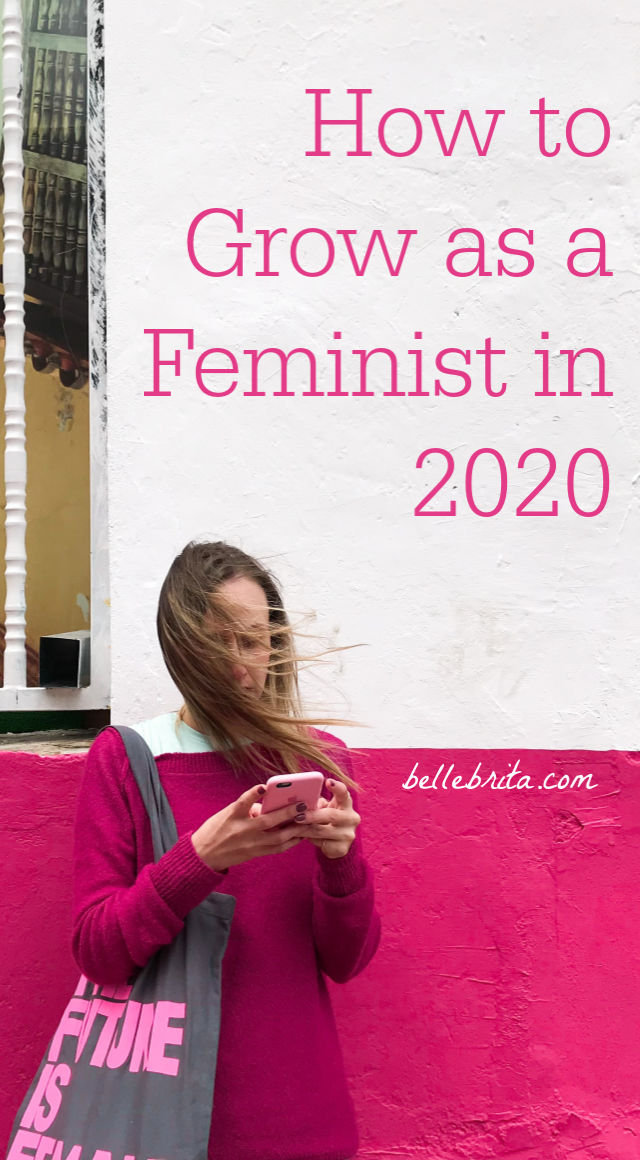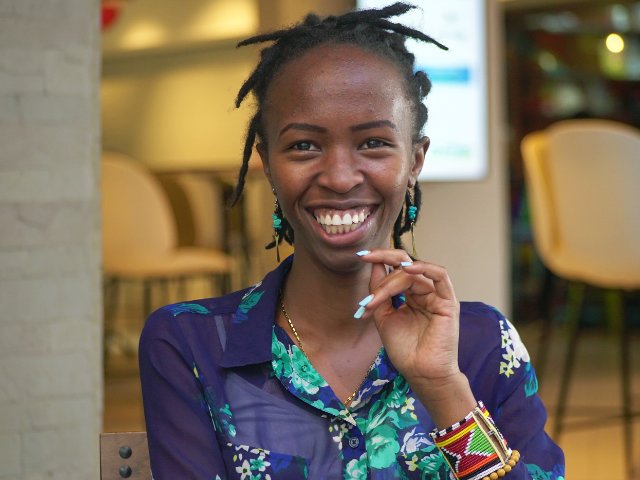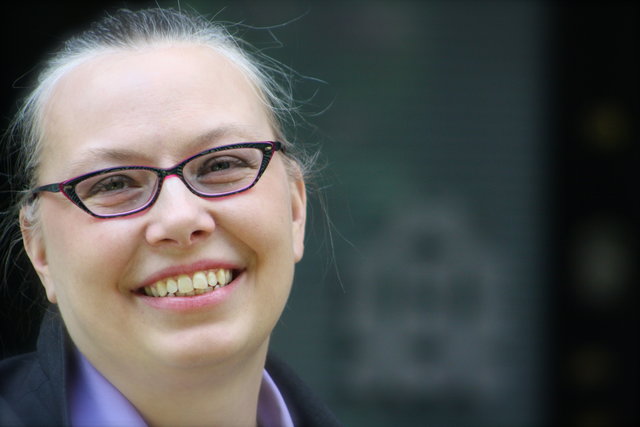Warning: Undefined array key "pagesize" in /home/belleb8/public_html/wp-content/plugins/inlinkz-scripter/InLinkz_scripter.php on line 43
Warning: Undefined array key "noentry" in /home/belleb8/public_html/wp-content/plugins/inlinkz-scripter/InLinkz_scripter.php on line 48
Welcome to the fourth day of the 2020 Love Blog Challenge! Today’s prompt is Growth. Check out the announcement post for all the prompts and rules this month. You can still join the link-up for yesterday’s topic, Creativity.
I’ve been a feminist for about as long as I can remember. Even as a little kid I noticed when people treated my twin brother and me differently, for no reason other than our different genders.
For a long time, my feminism was self-taught. My parents certainly modeled feminist beliefs and behaviors to the best of their own self-taught abilities, but I was mostly on my own to learn the finer points of equality.
That meant my feminism was very much White Feminism for a long time. Taking Women and Gender Studies courses at Furman University certainly broadened my appreciation and understanding of feminism, but it wasn’t until I started reading more feminist articles online that I really began to grow as a feminist.
3 Ways to Grow as a Feminist This Year
There is a lot to learn about feminism. Just as a human being, I constantly want to grow and to better myself. As a person committed to equality, I also want to grow as a feminist.
If you are also committed to growing as a feminist, I can help! Follow these easy tips to grow as a feminist.

Diversify Your Reading Material
When it comes to my leisure reading, I tend to read a lot of books by straight white women. Last year I sought to change that, and I discovered multiple incredible novels by diverse authors. While reading for fun should always be fun, you can still mix up your authors. There are so many diverse writers creating innovative content in all genres! Here are a few book lists to get you started.
- 27 Novels Feminists Should Read in 2020
- My 2019 in Books: What I Read and Loved
- 20 Essential Feminist Books to Read for Women’s History Month
I’ve also worked on broadening my nonfiction reading. I subscribe to the following:
- my local county newspaper
- The Washington Post
- Bitch Media
- Prevention Magazine
- Guideposts (an annual gift from my bestie)
I also read articles online from a variety of sources, including both professional news organizations and fellow bloggers.
What do you read online? Do you seek out different opinions and sources, or do you stick with just a few trusted writers? This year, I encourage you to subscribe to at least one newspaper, preferably a local one. Read newspapers, magazines, blogs, and more from different publications. Challenge your own POV, but don’t be afraid to fact-check when you read an opinion piece.
Spend Your Money Thoughtfully
We all have different budgets. I don’t know your income or your expenses, so I’m not going to tell you where to spend your money. However, I do want to talk about how you spend your money.
I’m not going to get into the nitty-gritty of setting a budget, but I do advise you to sit down and make an honest, realistic budget to follow. Does your budget include charitable donations? Or does your budget have some leftover money that could be used to help others?
Multiple feminist organizations could use your financial support. Multiple non-profits that aren’t explicitly feminist could use your financial support. Here are just a few suggestions to get you started. Please research any non-profit before you donate!
- Black Lives Matter
- local food bank
- local homeless shelter
- Planned Parenthood
- local animal shelter
- local domestic violence shelter
- Global Giving
Charitable giving isn’t the only spending you should consider thoughtfully. Here are a few questions to guide your spending this year.
- Do you need more clothes?
- What can you buy secondhand?
- What local stores carry the items you need?
- Can you afford to spend more on a quality item that will last a long time?
- Can you repair something instead of replacing it?
- Do your favorite stores or brands have similar values to your own?
Navigating capitalism is challenging. I still shop at Amazon on a regular basis. Just do what you can to buy less overall, to buy secondhand, and to buy from companies who care about people and the environment.
Check Your Privilege
Time to be blunt.
White people, we need to do better.
I am a bisexual woman with Crohn’s Disease and depression. Absolutely I experience prejudice. I fail to meet the expectations of able-bodied people who are clueless about chronic illness.
But I am a white, middle-class American. That adds up to a lot of privilege, even with my own challenges in life. I can use that privilege to be selfish, or I can use that privilege to help others.
If you’re ready to learn more about privilege, here’s some selected reading.
- Feminism 101: An Introduction to Privilege
- #SolidarityIsForWhiteWomen, Part 2: On Rose McGowan and the Continued Failure of White Feminism
- When Feminism Is White Supremacy in Heels
- So You Call Yourself an Ally: 10 Things All ‘Allies’ Need to Know
- Intent vs. Impact: The Road to Hell is Paved with Good Intentions
If someone calls you out on your privilege, avoid the knee-jerk defensive reaction. Take a deep breath, count to ten, and think about your privilege in the situation. Are you attempting to speak for a group that isn’t your own? Are you minimizing someone else’s experience? How could your privilege color your interpretation of the situation?
After your reflection, listen to whomever pointed out your privilege. If they are willing to educate you (and don’t assume that they are), listen to their perspective. Recenter the conversation on the marginalized.
Calling In vs. Calling Out
Remember there will be times when you need to tell someone to check their privilege. Especially if you also share in a particular privilege, that other person might be more willing to listen to you and accept your constructive criticism.
If that is the case, try to “call in” rather than “call out.” We are all learning to be better feminists, and we’ll make mistakes along the way. Yes, there will be occasions when you need to call someone out in the moment, particularly if that means standing up for someone else in the conversation. However, there are other times when a private conversation is more appropriate.
- What Does Call-In Mean? When Call-Out Culture Feels Toxic, This Method Can Be Used Instead
- Calling In: A Quick Guide on When and How
It won’t always be easy to grow as a feminist. However, it’s still a goal we should all share. We should all want to be more empathetic people with a heart for social justice.
Meet Your 2020 Love Blog Challenge Hosts!

Blog // Twitter // Instagram // Facebook // Pinterest // Tumblr // Bloglovin
Brita Long is the pink and sparkly personality behind the Christian feminist lifestyle blog, Belle Brita. On her blog and social media, you’ll discover more than authentic storytelling–she’s brutally honest about pursuing a fulfilling and joyful life even with Crohn’s Disease and depression.

Blog // Twitter // Instagram // Facebook // Pinterest // Bloglovin
Sarah is a 22-year-old digital content creator who loves reading, writing, fashion, music, travel, coffee, and a blank screen (page). Her favourite things to do are reading, swimming, making animation films, hiking, and listening to music.

Blog // Twitter // Facebook // Bloglovin // Facebook Writing
Mardra Sikora believes in the power of words. She uses both fiction and non-fiction to advocate for and with her adult son, Marcus. She is co-Author of The Parent’s Guide to Down Syndrome: Advice, Information, Inspiration, and Support for Raising Your Child from Diagnosis through Adulthood. Her work is also included in a variety of anthologies, national websites, and on her own website.

 Loading InLinkz ...
Loading InLinkz ...
I hope you will join me this year in growing as a feminist! What other suggestions do you have to grow as a feminist in 2020?
